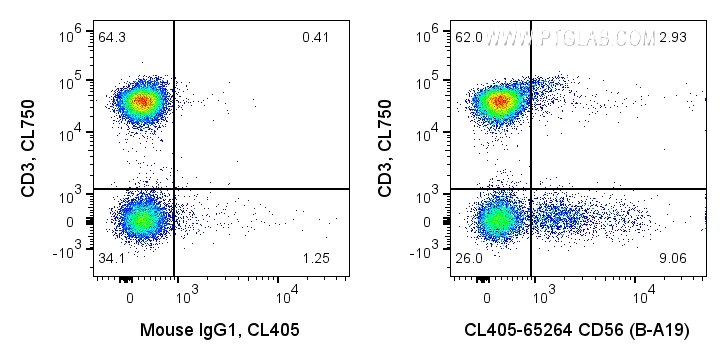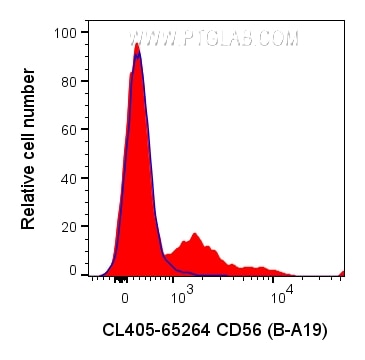Validation Data Gallery
Tested Applications
| Positive FC detected in | human PBMCs |
Recommended dilution
| Application | Dilution |
|---|---|
| Flow Cytometry (FC) | FC : 5 ul per 10^6 cells in 100 μl suspension |
| This reagent has been pre-titrated and tested for flow cytometric analysis. The suggested use of this reagent is 5 μl per 10^6 cells in a 100 µl suspension or 5 μl per 100 µl of whole blood. | |
| Sample-dependent, Check data in validation data gallery. | |
Product Information
CL405-65264 targets NCAM1/CD56 in FC applications and shows reactivity with human samples.
| Tested Reactivity | human |
| Host / Isotype | Mouse / IgG1 |
| Class | Monoclonal |
| Type | Antibody |
| Immunogen |
N/A 相同性解析による交差性が予測される生物種 |
| Full Name | neural cell adhesion molecule 1 |
| GenBank accession number | BC014205 |
| Gene Symbol | NCAM1 |
| Gene ID (NCBI) | 4684 |
| ENSEMBL Gene ID | ENSG00000149294 |
| RRID | AB_3083850 |
| Conjugate | CoraLite® Plus 405 Fluorescent Dye |
| Excitation/Emission maxima wavelengths | 399 nm / 422 nm |
| Form | |
| Form | Liquid |
| Purification Method | Affinity purification |
| UNIPROT ID | P13591 |
| Storage Buffer | PBS with 0.09% sodium azide and 0.5% BSA{{ptg:BufferTemp}}7.3 |
| Storage Conditions | Store at 2-8°C. Avoid exposure to light. Stable for one year after shipment. |
Background Information
Neural cell adhesion molecule 1 (NCAM1, also known as CD56) is a cell adhesion glycoprotein of the immunoglobulin (Ig) superfamily. It is a multifunction protein involved in synaptic plasticity, neurodevelopment, and neurogenesis. NCAM1 is expressed on human neurons, glial cells, skeletal muscle cells, NK cells and a subset of T cells, and the expression is observed in a wide variety of human tumors, including myeloma, myeloid leukemia, neuroendocrine tumors, Wilms' tumor, neuroblastoma, and NK/T cell lymphomas.
Protocols
| Product Specific Protocols | |
|---|---|
| FC protocol for CL Plus 405 NCAM1/CD56 antibody CL405-65264 | Download protocol |
| Standard Protocols | |
|---|---|
| Click here to view our Standard Protocols |


